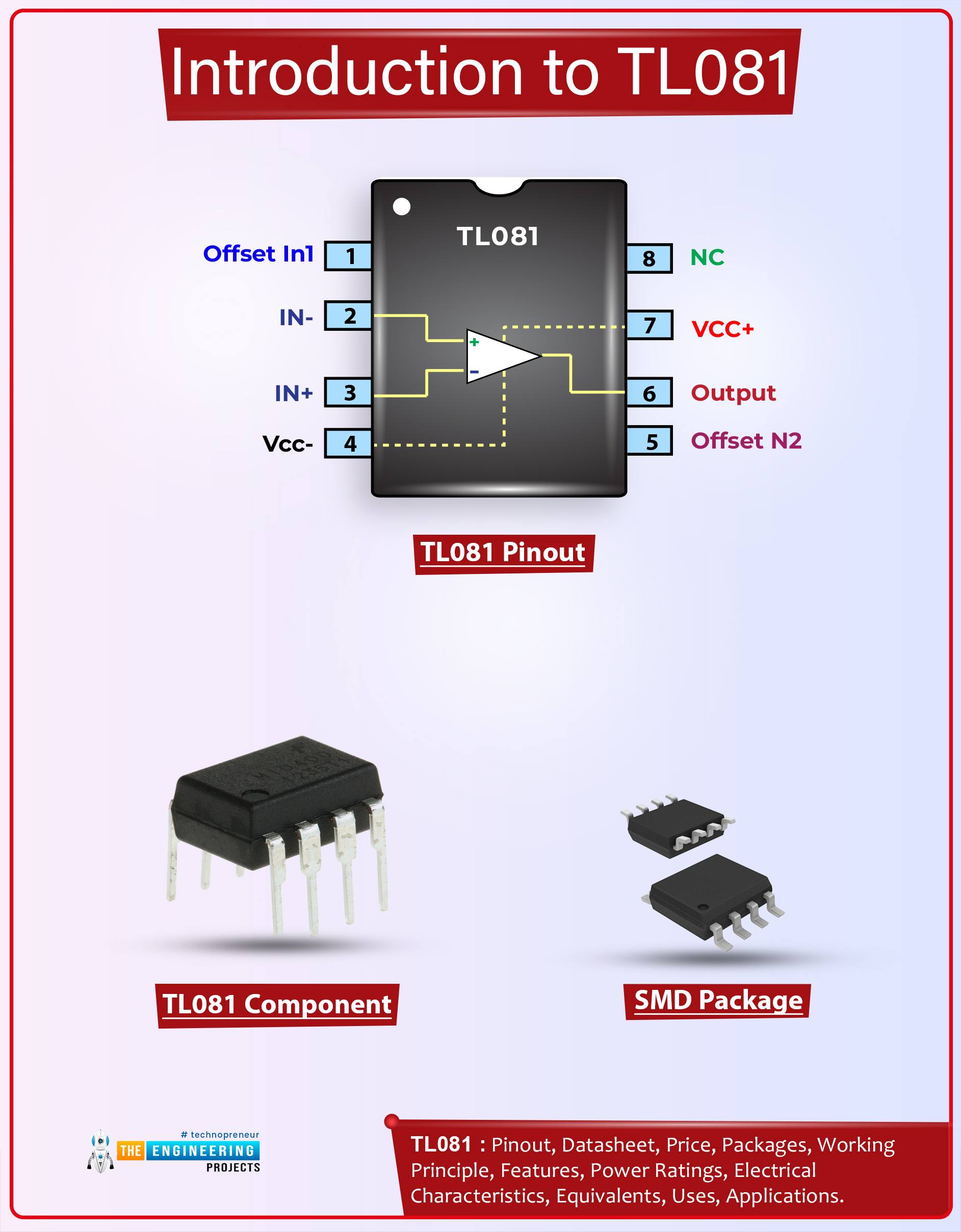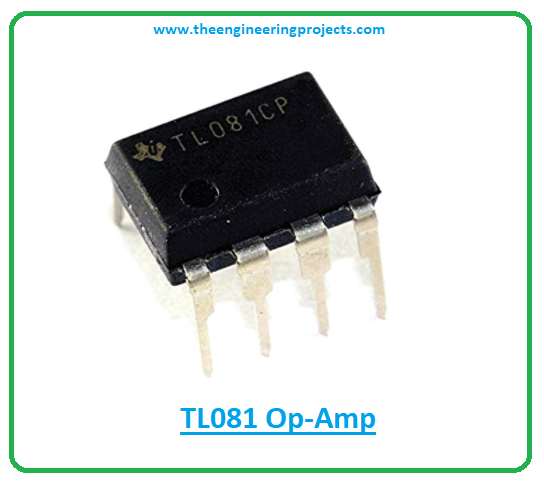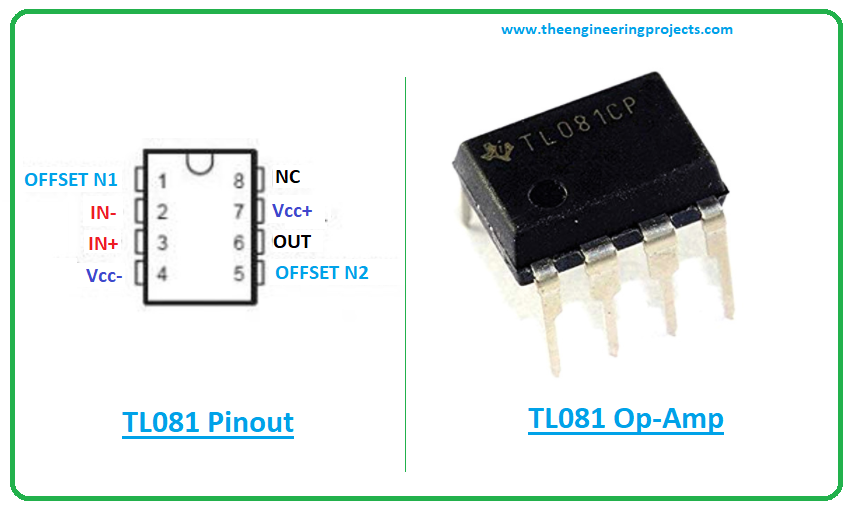
Hi Guys! Hope you’re well today. I welcome you on board. Happy to see you around. In this post today, I’ll detail the Introduction to TL081.
TL081 is a high-speed general-purpose JFET input single operational amplifier that comes with high noise immunity and better offset characteristics. It carries high input impedance and low offset current. The offset voltage of this device makes it an ideal match for amplifier applications. It incorporates well-matched bipolar transistors and high-voltage JFET in a compact IC.
Read this post till the end as I’ll detail the complete Introduction to TL081 covering datasheet, pinout, features, and applications. Let’s jump right in.
Introduction to TL081
- TL081 is a high-speed JFET input single operational amplifier that comes with high slew rates, and low offset and input bias currents.

- It features a low offset voltage temperature coefficient with a supply voltage of around +-18V and an input voltage of around +-15V.

- Plus, it incorporates internally trimmed offset voltage and needs low supply current
- It has the ability to maintain a fast slew rate and a large gain bandwidth.

TL081 Datasheet
Before you incorporate this device into your electrical project, it is wise to have a look at the datasheet of the device that features the main characteristics of the component. Click the link below and download the datasheet of TL081.
TL081 Pinout
There are a total of 8 pins incorporated in this op-amp as described below.
| Absolute Maximum Ratings TL081 | ||||
|---|---|---|---|---|
| Pin No. | Description | Pin Name | ||
| 1,5 | Used to set the offset voltage | |||
| 2 | Inverting Input | IN - | ||
| 3 | Non-inverting Input | IN + | ||
| 4 | Ground | GND | ||
| 6 | Output | Output | ||
| 7 | Voltage Supply | Vcc | ||
| 8 | Not connected | NC | ||
The following figure shows the pinout diagram of TL081.

Out of 8 pins on the integrated circuit, 7 are associated with particular functions while one pin (pin no. 8) is not connected.
TL081 Features
The following are the main features of TL081.
- Wide differential and common-mode voltage range
- Low input bias and offset current
- Input Bias Current = 200pA
- GBP - Gain Bandwidth Product = 3 MHz
- Latch-up free operation
- High slew rate = 16 V/us
- Supply Voltage: 7V to 36 V
- Power Dissipation = 670mW
- Available with internal frequency compensation
- CMRR - Common Mode Rejection Ratio = 70 dB to 86 dB
- Output short-circuit protection
- High input impedance
- Operating Supply Current = 1.4 mA
- Comes in 8-pin PDIP, SOIC Packages
TL081 Absolute Maximum Ratings
The following table shows the absolute maximum ratings of TL081.
| Absolute Maximum Ratings TL081 | ||||
|---|---|---|---|---|
| No. | Rating | Symbol | Value | Unit |
| 1 | Supply Voltage | Vcc | +-18 | V |
| 2 | Input Voltage | Vin | +-15 | V |
| 3 | Differential Input Voltage | Vid | +-30 | V |
| 4 | Power Dissipation | Ptot | 680 | mW |
| 5 | Output short-circuit duration | Infinite | ||
| 6 | Available Package | PDIP, SOIC Packages | ||
| 7 | Storage Temperature Range | Tstg | -65 to 150 | C |
- The values of all voltages, excluding differential voltage, are measured with respect to the ground of the supply voltages where the midpoint between VCC+ and VCC- is a zero reference level.
- It is important to note that the input voltage magnitude should never cross the supply voltage magnitude. The supply voltage here, in this case, is +-18V while the magnitude of the input voltage is +-15V.
- Power dissipation is 680mW and the storage temperature range is -65 to 150C.
- Differential voltages are considered as the non-inverting input terminal with respect to the inverting input terminal.
- Moreover, the output is shorted to ground or to either supply. Temperature and/or supply voltages must be in control so the dissipation rating is not exceeded.
- Short-circuits can cause destructive dissipation and excessive heating.
TL081 Applications
- Incorporated in audio pre-amplification.
- Used in amplifier circuits.
- Used in circuit requiring high input impedance.
- Sample and Hold Amplifiers
- Peak Detectors
- Active Filters
- Comparators
- Function Generators
That’s all about the Introduction to TL081. I hope you find this article helpful. If you’re unsure or have any questions, you can approach me in the section below, I’d love to help you the best way I can. Share your valuable suggestions and feedback around the content we share, they help us generate quality content customized to your exact needs and requirements. Thank you for reading the post.



